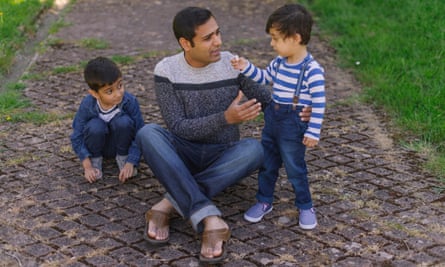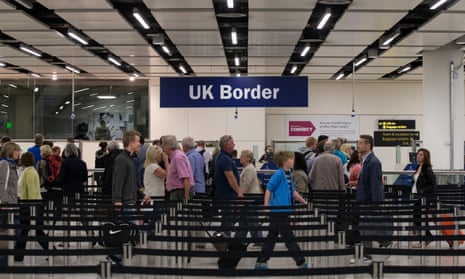The Home Office has wrongly tried to force at least 300 highly skilled migrants to leave Britain under an immigration rule used in part to tackle terrorists and those judged to be a threat to national security, government figures show.
The figures, revealed in a governmental review of its use of the controversial 322(5) provision, also suggest that up to 87 highly skilled migrants – including teachers, doctors, lawyers, engineers and IT professionals – have actually been wrongly forced to leave the UK under the terrorism-related legislation. A further 400 people may have been affected.
They are largely people who have lived in the UK for a decade or more and have British-born children. Many were given just 14 days to leave and were no longer eligible for a visa to visit the UK or any other country.
The Home Office directly identified 56 cases where a formal reconsideration of its decision to make people leave was required. This included 37 cases where “we concluded … that it is appropriate to give the applicant the benefit of any remaining doubt and grant indefinite leave to remain”.
But the review also shows 143 cases where people won on appeal in the first-tier tribunal and 101 cases that were won in the upper tribunal, at judicial review.
The number of those wrongly affected is likely to be substantially higher as the review only considered cases between January 2015 and May 2018. In addition, the first-tier tribunal has 372 cases outstanding and another 242 cases that could be allowed, which suggests that about a further 400 people could have been wrongly affected.
All the victims were denied the right to work, rent property or use the NHS during their appeals. Some chose to leave the UK but many of those who chose to stay and fight their cases were forced into destitution, debt and mental health issues, with some considering suicide, the review found. Children had suffered severe trauma and their parents feared it would have a life-long impact on them.
The Home Office has not responded to questions about whether it will provide compensation to those affected by its mistakes, whether those potentially wrongly forced from the UK will have their cases reconsidered, and if so, whether they will be invited back to the UK if it is found they were wrongly expelled. These actions were taken with victims of the Windrush scandal, to which this issue has been repeatedly compared.
The Home Office was forced to instigate a review of its use of the controversial paragraph of immigration law after an eight-month campaign by the Guardian that highlighted repeated uses of the power, suggesting it was being used to force migrants to leave the UK after making minor mistakes or legal amendments to their tax records.
The review revealed that 65% of Home Office 322(5) decisions were thrown out by the first-tier tribunal while 45% of applicants were successful at judicial review, against an ordinary applicant success rate of 28%. An extra 32% of “complex cases” could be wrongly decided, the review said.
It also revealed that across all immigration categories refusal of settlement applications was 5% until mid-2015, when it increased to 52% for tier 1 (general) migrants. Paragraph 322(5) of the rules has been a central reason given for the Home Office’s refusal of those in this group.
Paragraph 322(5) of the immigration rules, which has been condemned as “truly wicked” and “an abuse of power” by MPs and experts, forces migrants to leave the country citing “the undesirability of permitting the person concerned to remain in the United Kingdom in the light of his conduct (including convictions which do not fall within paragraph 322(1C), character or associations or the fact that he represents a threat to national security”.
Those affected argue that they made legal amendments to their tax records after discovering mistakes while preparing to apply for indefinite leave to remain.
The latest review looked at 1,697 applicants refused under paragraph 322(5). If the numbers of Home Office mistakes remained constant, this would mean up to 87 people have been wrongly forced to leave the UK.
Alison Thewliss, the MP for Glasgow Central, who has constituents fighting against removal under 322(5), said the government must offer all those affected a compensation package. She tabled a parliamentary question on Thursday asking whether the cases given the “benefit of the doubt” by the Home Office were those highlighted in the media.
“This review proves that the Home Office is overstepping and using paragraph 322(5) of the immigration rules inappropriately.”
The review found that the most common mistake made by the Home Office was its failure to distinguish between a late submission of tax and an amended tax return. “It’s incredible that the Home Office is employing case workers who don’t have even the most basic tax knowledge,” Thewliss said.
Syed Naqvi, the head of the immigration department at ITN solicitors, said the review tried to downplay the real picture behind the use of 322(5). “The Home Office acknowledge in the review that 65% of appeals and 45% of judicial reviews have been successful; however, despite spending a great deal of taxpayers’ money on this self-serving review, they still have the arrogance to claim that there isn’t a systematic problem with their approach in such cases,” he said.
“For them to say it’s not a dramatic issue is arrogance. This review is an exercise in them trying to cover their backs while blackening the names of applicants.”
A Home Office spokesperson said: “These calculations are purely speculative. The courts agree the Home Office’s use of paragraph 322(5), where the evidence shows applicants have attempted to misrepresent their earnings, is reasonable and to suggest otherwise is misleading.
“The immigration rule in question is one for general grounds of refusal and it’s completely wrong to say its primary use is fighting terrorism.”
A red bucket and two toy cars
Owais Raja, an engineer forced into homelessness by a Home Office error, thought his nightmare was over two months ago when he was finally given his visa as a result of the government review.
For almost three years, his young son had been unable to have potentially life-saving treatment for a hole in his heart and his wife had not been able to receive treatment for severe health problems.
The family was forced into destitution after wrongly being deemed a security threat over a tax error. Raja had his right to work, rent property and access the NHS wrongly removed from him.

After the Home Office admitted it was wrong to try to force Raja to leave the UK under paragraph 322(5), he found work as a lecturer at City College Plymouth. However, he could not return to the course he had been teaching because it had closed after no one with Raja’s expertise could be found to replace him.
Despite having a part-time job, Raja cannot rent a property: his history with the Home Office and the years of not being allowed to work mean he cannot pass the necessary credit check or show three months of payslips.
“Thanks to the Home Office, we have been homeless since September. The council keep moving us,” he said. “On Friday, we will move into our fourth one-bedroom B&B, where there will be no kitchen or facility for us to even warm our youngest child’s milk.”
Three years ago, the family had a modest but comfortable lifestyle. “Now we have just one suitcase and a holdall between us all,” Raja said. “We’ve sold everything we can, because we have no money, and got rid of everything else that doesn’t fit into these two bags..”
Raja’s sons have three toys: a red bucket and two toy cars. They have no books or pens, one thin jacket between them, and shoes that are too small and have holes in them.
“I look back at the life we led just three years ago and it seems like a dream,” Raja said. “The Home Office have forced us into destitution. It has subjected us all to a trauma that will impact heavily on us for our entire lives.
“The Home Office … behaved as if they wanted to destroy us and even though they’ve had to admit they were wrong, they’ve largely succeeded in doing that anyway.”








